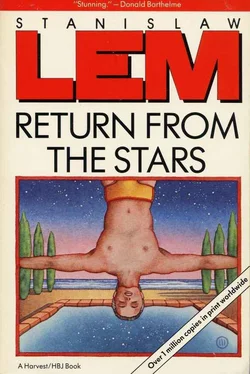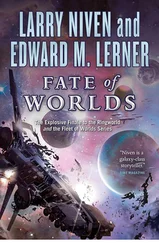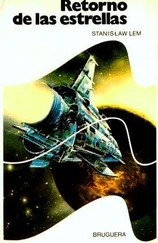We passed a number of half-empty bars, shopwindows in which groups of mannequins were performing the same scene over and over again, and I would have liked to stop and see what they were doing, but the girl hurried along, her slippers clicking, until, at the sight of a neon face with pulsating red cheeks, which continually licked its lips with a comically loose tongue, sheened:
“Oh, bonses! Do you want a bons?”
“Do you?” I asked.
“I think I do.”
We entered a small bright room. Instead of a ceiling it had long rows of tiny flames, like pilot lights; from above poured heat, so possibly it was indeed gas. In the walls I saw recesses with counters. When we approached one of these, seats emerged from the wall on either side of us; they seemed first to grow out from the wall in an undeveloped form, like buds, then flattened in the air, turned concave, and became motionless. We sat facing each other; the girl tapped two fingers on the metal surface of the table, and from the wall jumped a nickel claw, which tossed a small plate in front of each of us and with two lightning movements threw on each plate a portion of some white substance that foamed, turned brown, and hardened; meanwhile the plate itself grew darker. The girl then folded it — it was not a plate at all — into the shape of a pancake and began to eat.
“Oh,” she said with a full mouth, “I didn’t know how hungry I was!”
I did exactly as she. The bons tasted like nothing I had ever eaten. It crackled between the teeth like a freshly baked roll, but immediately crumbled and melted on the tongue; the brown stuff in the middle was sharply seasoned. I was going to like bonses, I decided.
“Another?” I asked, when she had finished hers. She smiled, shaking her head. On the way out, in the aisle, she put both her hands into a small niche lined with tiles; something in there buzzed. I followed suit. A tickling wind blew on my fingers, and when I withdrew them, they were completely dry and clean. Next we ascended a wide escalator. I did not know if this was still the station but preferred not to ask. She led me to a small cabin inside a wall, not very brightly lit; I had the impression that above it trains of some kind were running, since the floor shook. It got dark for a fraction of a second, something beneath us gave a deep sigh, like a metal monster emptying its lungs of air, the light reappeared, the girl pushed open the door. A real street, apparently. We were quite alone on it. Bushes, trimmed fairly low, grew on either side of the sidewalk; somewhat farther along stood flat black machines, crowded together; a man came out of a shadow, disappeared behind one of the machines — I did not see him open any door, he simply vanished — and the thing took off with such force that it must have flattened him against his seat. I saw no houses, only the roadway, as smooth as a table and covered with strips of dull metal; at the intersections, hanging overhead, were shuttered lights, orange and red; they looked a little like models of wartime searchlights.
“Where shall we go?” asked the girl. She still held me by the arm. She slackened her pace. A red stripe passed across her face.
“Wherever you like.”
“My place, then. It isn’t worth taking a gleeder. It’s nearby.”
We walked on. Still no houses in sight, and the wind that came rushing out of the darkness, from behind the shrubbery, was the kind you would expect in an open space. Here, around the station, in the Center itself? This seemed odd to me. The wind bore a faint fragrance of flowers, which I inhaled eagerly. Cherry blossom? No, not cherry blossom.
Next we came to a moving walkway; we stood on it, a strange pair; lights swam by; now and then a vehicle shot along, as if cast from a single block of black metal; these vehicles had no windows, no wheels, not even lights, and careered as though blindly, at tremendous speed. The moving lights blazed out of narrow vertical apertures hanging low above the ground. I could not figure out whether they had something to do with the traffic and its regulation.
From time to time, a plaintive whistle high above us rent the unseen sky. The girl suddenly stepped off the flowing ribbon, but only to mount another, which darted steeply upward, and I found myself suddenly high up; this aerial ride lasted maybe half a minute and ended at a ledge covered with weakly fragrant flowers, as if we had reached the terrace or balcony of a dark building by a conveyor belt set against the wall. The girl entered this loggia, and I, my eyes now accustomed to the dark, was able to discern, from it, the huge outlines of the surrounding buildings, windowless, black, seemingly lifeless, for they were without more than light — not the slightest sound reached me, apart from the sharp hiss that announced the passage, in the street, of those black machines. I was puzzled by this blackout, no doubt intentional, as well as by the absence of advertising signs, after the orgy of neon at the station, but I had no time for such reflections. “Come on, where are you?” I heard her whisper. I saw only the pale smudge of her face. She put her hand to the door and it opened, but not into an apartment; the floor moved softly along with us — you can’t take a step here, I thought, it’s a wonder they still have legs — but this irony was a feeble effort; it came from the constant amazement, from the feeling of unreality of everything that had happened to me in the past several hours.
We were in something like a huge entrance hall or corridor, wide, almost unlit — only the corners of the walls shone, brightened by streaks of luminous paint. In the darkest place the girl again reached out her hand, to place her palm flat against a metal plate on a door, and entered first. I blinked. The hall, brightly lit, was practically empty; she walked to the next door. When I came near the wall, it opened suddenly to reveal an interior filled with small metal bottles of some kind. This happened so suddenly that I froze.
“Don’t set off my wardrobe,” she said. She was already in the other room.
I followed her.
The furniture — armchairs, a low sofa, small rabies — looked as though it had been cast in glass, and inside the semitransparent material swarms of fireflies circulated freely, sometimes dispersed, then joined again into streams, so that a luminous blood seemed to course within the furniture, pale green with pink sparks mixed in.
“Why don’t you sit down?”
She was standing far back. An armchair unfolded itself to receive me. I hated that. The glass was not glass at all; the impression I had was of sitting on inflated cushions, and, looking down through the curved, thick surface of the seat, I could, indistinctly, see the floor.
I had thought, upon entering, that the wall opposite the door was of glass, and that through it I was looking into another room, which contained people, as though a party were in progress there; but those people were unnaturally tall — and all at once I realized that what I had in front of me was a wall-sized television screen. The volume was off. Now, from a sitting position, I saw an enormous female face, exactly as if a dark-skinned giantess were peering through a window into the room; her lips moved, she was speaking, and gems as big as shields covered her ears, glittered like diamonds.
I made myself comfortable in the chair. The girl, her hand on her hip — her abdomen really did look like a sculpture in azure metal — studied me carefully. She no longer appeared drunk. Perhaps it had only seemed that way to me before.
“What’s your name?” she asked.
“Bregg. Hal Bregg. And yours?”
“Nais. How old are you?”
Curious manners, I thought. But, then, if that’s what’s done…
“Forty — what of it?”
Читать дальше











